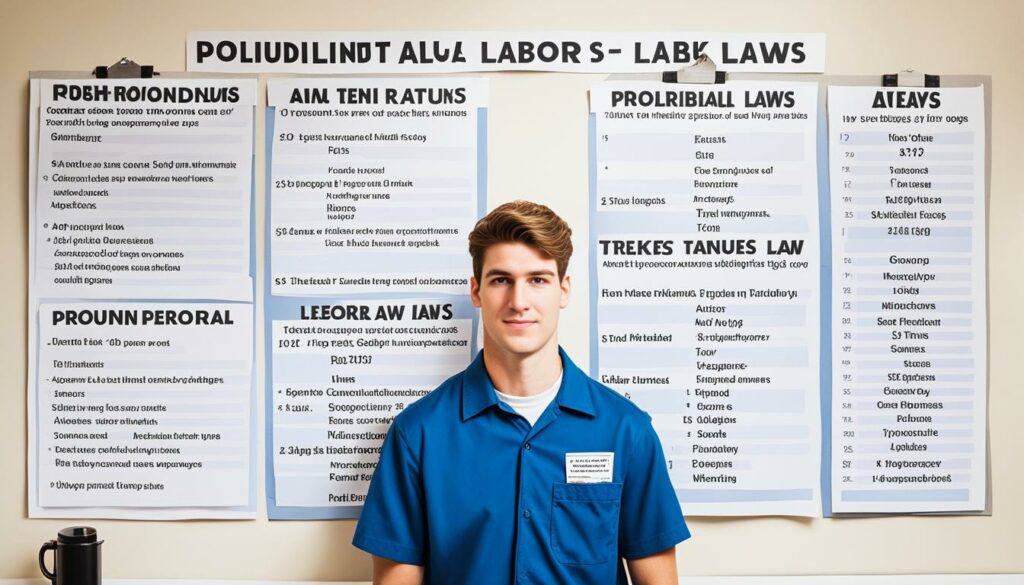Understanding Teen Work Hours: A Guide
Welcome to our comprehensive guide on understanding teenage work hours and the regulations surrounding teen employment. As teenagers navigate their way into the workforce, it is crucial for them, their parents, educators, and employers to be aware of the laws and guidelines that govern their work hours.
Many young students are eager to take on part-time jobs to gain experience, learn responsibility, and earn a bit of money. However, it is important to strike a balance between work and other commitments such as school and extracurricular activities. Understanding the work hour restrictions for teens ensures that they can fulfill their responsibilities without compromising their well-being and growth.
So, how many hours can teens work? In this guide, we will explore federal and state labor laws that govern teenage employment. We will discuss age requirements, maximum work hours, prohibited occupations, and valuable resources available to both teenagers and employers.
Key Takeaways:
- Understanding work hour regulations for teenagers is essential for compliance with labor laws.
- Federal and state labor laws govern teen employment, including age requirements and maximum work hours.
- Teenagers are generally limited to working 6 days a week and 10 hours a day.
- Hazardous occupations are prohibited for young workers to ensure their safety.
- Resources like YouthRules and the Fair Labor Standards Act provide valuable information on teen labor laws.
Federal and State Labor Laws for Teen Workers

Federal and state labor laws play a crucial role in safeguarding the rights of young workers and ensuring their fair treatment in the workplace. These laws, which are designed to protect the well-being of teenage employees, include regulations on work hours, minimum age requirements, and prohibited occupations.
When it comes to regulating teen employment, both federal and state laws come into play. In cases where there are inconsistencies between the two sets of laws, the more restrictive law is applied, ensuring greater protection for young workers.
A key facet of labor laws for teen employees is the ability to lodge complaints and initiate investigations into violations. If a teenager believes their rights have been violated, they have the right to report the issue, and employers are prohibited from retaliating against workers who exercise their rights.
Educating young workers, parents, educators, and employers about labor laws is essential for fostering an environment of compliance and awareness. Various resources are available to provide guidance and information on federal and state labor laws, such as the YouthRules website, which is dedicated to providing information for young workers. Additionally, the Fair Labor Standards Act (FLSA) sets specific guidelines for wage, hours worked, and safety standards for teen employees.
“Federal and state labor laws aim to protect the rights of young workers and ensure their fair treatment in the workplace.”
It is vital for all parties involved in teen employment, including teenagers themselves, their parents, educators, and employers, to have a comprehensive understanding of federal and state labor laws. This knowledge empowers them to navigate the intricacies of labor regulations and foster an environment that prioritizes the safety and well-being of young workers.
Key Highlights of Federal and State Labor Laws for Teen Workers
| Area | Federal Labor Laws | State Labor Laws |
|---|---|---|
| Work Hours | Limitations on the number of hours worked per day and week | May have more restrictive or additional limitations |
| Minimum Age Requirements | Minimum age of 14 for most jobs, with some exceptions | May have stricter minimum age requirements |
| Prohibited Occupations | List of hazardous occupations and activities | May have additional restrictions based on state-specific hazards |
| Complaint Procedures | Process for filing complaints and investigating violations | State-specific procedures for filing complaints |
| Retaliation Protection | Prohibition on employers retaliating against workers for asserting their rights | May have additional provisions for protecting workers from retaliation |
The table above provides a summary of some key highlights of federal and state labor laws for teen workers. It is important to note that state laws may vary, and it is essential to consult the specific labor laws of the state in question for comprehensive information.
Age and Work Permit Requirements for Teen Workers

When it comes to teen employment, there are age requirements that determine eligibility for certain jobs. Although most positions have a minimum age requirement of 14, there are exceptions to this rule. It’s important for young individuals and their parents to be aware of these age restrictions before considering employment opportunities.
Additionally, a work permit is often necessary for teen workers before they can start their job. This permit is typically obtained from either the student’s school or the state labor department. Both the employer and the child’s school must approve and sign the work permit, ensuring that all parties involved are aware of the teen’s employment.
The specific work hours and conditions for teen workers can vary depending on their age and whether or not school is in session. Understanding these regulations is crucial for employers, parents, and teenage workers alike to ensure compliance with labor laws and to maintain a safe and positive work experience.
It’s important to note that all teen workers, regardless of age, must be supervised by someone who is at least 18 years old. This ensures that young workers have guidance and support throughout their employment, prioritizing their safety and well-being.
Work Permit Requirements
Obtaining a work permit is a vital step for teens before they can begin their employment journey. The work permit process involves the following:
- Contacting the student’s school or state labor department to inquire about work permit requirements and procedures.
- Completing any necessary forms or applications, providing personal information and details about the job the teen will be working.
- Obtaining approval from both the employer and the child’s school by submitting the completed work permit form.
- Ensuring that the work permit is readily available at the worksite, as it may be subject to inspection by labor authorities.
By following these steps, teen workers can obtain the required work permit and legally begin their employment.
Age Requirements and Work Permits by State
| State | Minimum Age | Work Permit Required | Permit Issuer |
|---|---|---|---|
| California | 14 | Yes | School/State Labor Department |
| New York | 14 | Yes | School/State Labor Department |
| Texas | 14 | Yes | School/State Labor Department |
| Florida | 14 | No | N/A |
| Illinois | 14 | Yes | School/State Labor Department |
Image: A teenage worker with a work permit, ready to enter the workforce.
Maximum Work Hours for Teenagers

It is important to understand the maximum work hours allowed for teenagers to ensure their well-being and compliance with labor laws. Teenagers are generally limited to working no more than 6 days in a week and 10 hours in a day. However, the specific start and end times of work may vary depending on the age of the teen and their school schedules.
These work hour limits are in place to prevent overwork and safeguard the physical and mental health of teen workers. It is crucial for employers, parents, and teens themselves to be aware of these restrictions to promote a healthy work-life balance.
By implementing these limits, employers can ensure that teenage employees have enough time for rest, educational activities, and social engagements. It also allows them to prioritize their studies, extracurricular activities, and personal development.
Creating a supportive and balanced work environment for teenagers fosters their overall growth and sets a foundation for responsible work habits in the future.
The Importance of Limiting Work Hours for Teenagers
Limiting the number of hours teenagers can work is crucial for several reasons:
- Physical well-being: Teenagers are still growing and developing, and excessive work hours can lead to physical fatigue and strain. Limiting work hours helps prevent the risk of injuries, exhaustion, and burnout.
- Mental well-being: Teenagers also need time for relaxation, leisure activities, and socializing. The limitations on work hours promote a healthy balance between work and other important aspects of their lives, reducing stress and promoting mental well-being.
- Academic performance: School plays a vital role in a teenager’s education, and excessive work hours can have a negative impact on their ability to focus on their studies. By setting limits on work hours, teenagers can prioritize their academics and achieve better educational outcomes.
It is important for employers and parents to communicate and collaborate in ensuring that teenagers are not overwhelmed with work hours that hinder their overall development.
Prohibited Occupations for Teen Workers
When it comes to the employment of teenagers, there are certain hazardous occupations that they are prohibited from engaging in. These restrictions have been put in place to ensure the safety and well-being of young workers, protecting them from potential physical and emotional harm in the workplace.
Teen workers are not allowed to perform tasks that involve driving vehicles or using power-driven equipment. These occupations are considered to be high-risk and require specialized skills and experience that are not suitable for young workers.
By prohibiting teenagers from these hazardous occupations, we are safeguarding them from potential accidents and injuries. It is crucial for employers to respect these teen work restrictions and provide a safe working environment for young workers.
Here is a table highlighting some of the prohibited occupations for teen workers:
| Occupation | Reason for Prohibition |
|---|---|
| Driving a motor vehicle | The risk of accidents and lack of driving experience |
| Operating power-driven woodworking machines | The risk of cuts and amputations |
| Working on scaffolding | The risk of falls from heights |
| Operating power-driven meat processing machines | The risk of cuts and crush injuries |
As you can see, these prohibited occupations pose significant dangers to the well-being of young workers. Employers and parents should be aware of these restrictions and ensure that teenagers are not exposed to such hazardous work conditions.
Protecting the safety and rights of young workers is our top priority. By enforcing these teen work restrictions, we are taking proactive measures to prevent workplace accidents and injuries.
It is important for employers, parents, educators, and teenagers themselves to understand and comply with these regulations. By doing so, we can create a safer and healthier work environment for our teenage workforce.
Resources for Understanding Teen Labor Laws

When it comes to understanding the intricacies of teen labor laws, there are several valuable resources available to young workers, parents, educators, and employers. These resources aim to provide comprehensive information on federal and state labor laws, wage requirements, work hours, and safety regulations specific to teen employees.
One essential resource is the YouthRules website, which serves as a valuable hub for information about labor laws for young workers. This website offers detailed insights into various aspects of teen employment, including the Fair Labor Standards Act (FLSA), age requirements, maximum work hours, and prohibited occupations. It serves as a comprehensive guide to ensure compliance with both federal and state regulations.
The Fair Labor Standards Act (FLSA) plays a crucial role in safeguarding the rights and well-being of teen employees. This federal law establishes standards for minimum wage, maximum work hours, and employee safety. By understanding the FLSA’s provisions, young workers can ensure they are being treated fairly and receive the necessary protection in the workplace.
In addition to government resources, the Chamber of Commerce also offers valuable information for small business owners seeking guidance on fair labor standards. Their free guide provides insights into employment regulations, compliance requirements, and best practices for ensuring a fair and safe work environment for teen employees.
For those looking to further explore career opportunities, workforce preparation, and educational programs, Michigan State University Extension offers an array of additional resources. These resources aim to support young workers in acquiring the necessary skills and knowledge to excel in their chosen career paths.
By utilizing these resources and staying informed about labor laws, young workers can navigate their employment journey with confidence, advocating for their rights, and promoting a safe and fair working environment.
Employment of Minors Under the FLSA
The Fair Labor Standards Act (FLSA) establishes important guidelines for the employment of minors. It sets the minimum age for employment at 14 years old, ensuring that young workers are protected from unfair labor practices.
The FLSA places limits on the number of hours that minors under 16 can work, safeguarding their well-being and educational opportunities. These regulations are in place to promote the healthy development of young workers.
Prohibited Occupations
“The FLSA prohibits the employment of minors in hazardous work,” states the Secretary of Labor. This means that certain occupations that pose significant risks to the safety and health of young workers are off-limits. By preventing minors from engaging in hazardous work, the FLSA aims to protect them from potential physical and emotional harm.”
State Laws and Minors Employment
In addition to federal laws, individual states also have their own regulations regarding the employment of minors. These state laws may offer further protection to young workers, ensuring their safety and well-being in the workplace.
It is important for employers and parents to familiarize themselves with both federal and state regulations to guarantee compliance and ensure the best interests of the minor are upheld.
Now let’s take a look at a table summarizing the key aspects of the employment of minors under the FLSA:
| Minimum Age for Employment | Maximum Work Hours for Minors Under 16 | Prohibited Occupations |
|---|---|---|
| 14 years old | No more than 3 hours on a school day No more than 18 hours in a school week No more than 8 hours on a non-school day No more than 40 hours in a non-school week |
Examples: Operating power-driven machinery, mining, manufacturing, or working with hazardous materials |
As we can see from the table above, the FLSA limits the hours that minors can work to ensure they have adequate time for education, rest, and other activities essential for their well-rounded development.
Employers and parents must be diligent in understanding and adhering to these regulations to create a safe and fair working environment for young workers.
Posting Requirements and Other Resources
Nonagricultural employers must comply with certain posting requirements to ensure transparency and inform employees of their rights. One of these requirements is the display of the Minimum Wage Poster, which lists the minimum age requirements for young workers. By prominently displaying this poster in the workplace, employers create a visible reminder of their commitment to fair labor practices.
State labor offices play a crucial role in providing comprehensive information on child labor laws specific to each state. These offices can offer guidance on age restrictions, work permits, and other regulations that apply to the employment of minors. It is essential for employers to familiarize themselves with the specific requirements of their state to ensure compliance and promote a safe work environment.
Employers and young workers seeking additional information on the employment of minors can benefit from a variety of online resources. There are numerous webpages and tools available that provide insights into federal and state labor laws, including information on prohibited occupations, maximum work hours, and rights and safety regulations for young workers.
Compliance with posting requirements and accessing resources from state labor offices are crucial steps in ensuring the proper employment of minors and the protection of their rights.
The Importance of Posting Requirements
Posting requirements are not merely a legal obligation, but also serve as a means of fostering a transparent and fair work environment. By displaying the Minimum Wage Poster, employers communicate their commitment to compliance with labor laws and the protection of young workers from exploitation. This visual reminder plays a significant role in promoting employee trust and establishing a positive workplace culture.
State Labor Offices: A Valuable Resource
State labor offices are invaluable sources of information and guidance for employers and young workers alike. They possess in-depth knowledge of state-specific child labor laws and can address any concerns or inquiries related to the employment of minors. By reaching out to state labor offices, employers can ensure compliance with all relevant regulations, creating a safe and productive working environment.
Online Resources for Additional Information
Various online resources provide comprehensive information on federal and state labor laws, helping employers and young workers stay informed about their rights and responsibilities. These resources can help determine if a job falls under the regulations of the Fair Labor Standards Act (FLSA) and provide additional guidance on employing minors. Accessing these tools and webpages allows for easy navigation of complex labor laws, ensuring compliance and safeguarding the well-being of young workers.
Young Worker Safety and Rights
Ensuring the safety and rights of young workers is an essential aspect of teen employment regulations. Employers have a responsibility to promote a safe work environment and take proactive measures to prevent workplace injuries. By adhering to minimum age limits, young workers are protected from engaging in potentially dangerous work.
Young worker rights encompass various aspects, including fair wages, reasonable working hours, and the right to a safe and healthy workplace. It is crucial for employers to provide proper training, supervision, and guidance to young workers to mitigate any risks and hazards associated with their job tasks.
Preventing workplace injuries is a top priority in young worker safety. Employers must conduct thorough risk assessments and implement appropriate safety measures to protect young workers from accidents, injuries, and occupational illnesses. This includes providing personal protective equipment, implementing safety protocols, and ensuring proper training for hazard recognition and avoidance.
Key Rights and Protections for Young Workers:
- The right to a safe and healthy work environment
- Fair wages and compensation
- Protection from discrimination and harassment
- The right to reasonable working hours
- Access to proper training and guidance
Preventing Workplace Injuries:
Employers should prioritize the following measures to prevent workplace injuries among young workers:
- Conduct comprehensive workplace hazard assessments
- Provide appropriate personal protective equipment
- Implement safety protocols and procedures
- Ensure proper training on hazard recognition and avoidance
- Foster a culture of safety through ongoing education and communication
“Young workers have the right to a safe and healthy workplace. Employers must provide the necessary training and protections to prevent workplace injuries and ensure their well-being.”
By upholding young worker rights and prioritizing their safety, employers can create a positive and empowering work environment for young workers. It is essential for employers, parents, educators, and policymakers to work together to educate and enforce regulations that safeguard young workers from potential harm in the workplace.
| Common Workplace Hazards | Prevention Measures |
|---|---|
| Slips, trips, and falls | Keep walkways clear and provide non-slip surfaces. Provide training on proper footwear and safe movement. |
| Exposure to hazardous substances | Implement controls, such as proper ventilation and personal protective equipment. Provide training on handling hazardous substances. |
| Workplace violence | Establish clear policies and procedures to prevent and respond to workplace violence incidents. Provide training on conflict resolution and personal safety. |
| Ergonomic hazards | Ensure proper workstation setup and encourage regular breaks. Provide training on proper lifting techniques and ergonomics. |
Conclusion
In conclusion, it is crucial for teenagers, parents, educators, and employers to have a clear understanding of the work hours allowed for young workers. The Federal and state labor laws play a vital role in regulating teen employment, ensuring the safety and well-being of these individuals.
These labor laws cover various aspects of teen employment, including age requirements, maximum work hours, and prohibited occupations. By adhering to these regulations, we can protect young workers from potential hazards and promote a safe working environment.
It is essential to educate ourselves about the rules and resources available to ensure compliance with these labor laws. By doing so, we can empower young workers and create better opportunities for their growth and development.
FAQ
How many hours can teens work?
Teenagers are generally limited to working no more than 6 days in a week and 10 hours in a day. The specific start and end times of work depend on the age of the teen and school schedules.
What are the federal and state labor laws for teen workers?
Federal and state labor laws regulate the employment of teenagers. Inconsistencies between state and federal laws are resolved by applying the more restrictive law. Various resources are available for educating young workers, parents, educators, and employers about labor laws.
What are the age and work permit requirements for teen workers?
Most jobs have a minimum age of 14, with some exceptions. A work permit is required before starting work, which can be obtained from schools or state labor departments. The employer and child’s school need to approve the work permit.
What are the maximum work hours for teenagers?
Teenagers are generally limited to working no more than 6 days in a week and 10 hours in a day. The specific start and end times of work depend on the age of the teen and school schedules.
What are the prohibited occupations for teen workers?
Teen workers are prohibited from engaging in hazardous occupations, such as driving vehicles or using power-driven equipment. These restrictions are in place to protect young workers from potential physical and emotional harm in the workplace.
What resources are available for understanding teen labor laws?
The YouthRules website provides information about federal and state labor laws for young workers. The Fair Labor Standards Act (FLSA) sets wage, hours worked, and safety requirements for teen employees. The Chamber of Commerce offers a free guide on fair labor standards for small business owners.
What are the employment rules for minors under the Fair Labor Standards Act?
The Fair Labor Standards Act sets the minimum age for employment at 14 years old and limits the number of hours worked by minors under 16. The FLSA prohibits the employment of minors in hazardous work, as determined by the Secretary of Labor.
What are the posting requirements and other resources for teen workers?
Nonagricultural employers are required to post the Minimum Wage Poster listing minimum age requirements. State labor departments can provide information on child labor laws specific to each state. Various webpages and tools are available for determining if a job is covered by the FLSA and obtaining additional information on the employment of minors.
What safety and rights do young workers have?
Ensuring the safety and rights of young workers is an important aspect of teen employment regulations. Employers should promote a safe work environment and take measures to prevent workplace injuries. Minimum age limits are enforced to protect young workers from engaging in potentially dangerous work.







